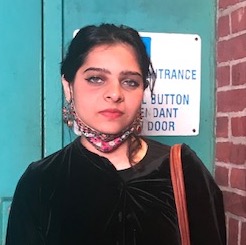
Mariya (Masha) Deykute
What is your writing process like?
Sporadic and flexible. I have two young children, and a full-time job, so writing happens around that. Sometimes it’s a half hour in the morning, sometimes fifteen minutes on the playground, sometimes in whatsapp messages with myself on my phone. There are times when I think it makes for the best kind of writing — free from the doubt and hesitation that a freer schedule used to bring, and sometimes I fall into a pit of despair that leaves me wondering if I am losing the chance to write the great American novel because I’m not on a desert island with a typewriter. Normal stuff.
Mostly, though, when the going is good, I find that my writing process is often something like a secret affair or obsession, something I waltz with on time stolen from my regular work; something I pursue with feverish impatience when the rest of the house is asleep.
What is your earliest memory of hearing or being inspired by poetry?
My mother, who in all other respects was a tantalizing, terrifying mystery, reading Tsvetaeva to me aloud. I remember her voice, like sharing a secret, or a prayer, and the words, and the sudden oppenness of her face. I must’ve been all of four or five, but I still remember the feeling of awe, the realization that these words are transforming my mother into this soft, glowing, feeling, human person, and she is giving them to me, just me.
Any new hobbies or habits you’ve picked up since the Pandemic started?
I got into the habit of making my bed, which inevitably means I’ve been fully domesticated, alas. But being stuck in one space for months upon months does that to you, I guess. I’ve returned to drawing, which I haven’t done in many, many years.
I’ve also picked up a pandemic baby, if you can say that. I can say it, anyhow. He’s been the best new habit, and a very appreciative poetry consumer. We are reading Robert Morgan and C.K. Williams and Sam Cha and Elvira Basevitch together. He’s only eaten one book cover so far, but he already seems wiser and yells at the wind poetically.

Mckendy Fils-Aimé
What is your writing process like?
Like many writers, the majority of my poems are products of concepts, observations, or emotions that I want to explore. Most of my poems start out the same. I see or hear something interesting and it inspires a line that eventually turns into a poem. Generally, it takes me about 3-5 days to write a rough draft. If I’m excited by the poem, I spend another week making revisions.
After revisions, if I still like the poem, I share it with a small group of friends and poets who I trust. After gathering their feedback, I make more edits. Around this time, I start reading the poem at open mics to see how it’s received by a live audience. It’s always important for me to know how poems live on the page and the stage. Finally, if I think that the poem is worth submitting for publication, I bring it to a writing workshop. I incorporate the feedback and then off it goes. After workshopping the poem, I let it sit for a while, only returning to it on occasion.
What is your earliest memory of hearing or being inspired by poetry?
My earliest memory of being inspired by poetry was in my 10th grade English class. My teacher shared a poem by Edgar Allen Poe called Annabel Lee. In retrospect, the poem was pretty creepy, but at the time, I found it fascinating. My teacher did a really great job of getting me to engage with the poem. He argued that the poem might have a dual meaning and I thought that that was the coolest thing. Shortly after that, I wrote my first poem. The rest is history.
Any new hobbies or habits you’ve picked up since the Pandemic started?
During the Pandemic, I started a record collection. Growing up, I had a record player in the house and wanted to own one as an adult. I also feel like some albums just sound better on vinyl. I had been meaning to start a collection for years, but never got around to buying a record player. That changed when my partner got me one for Christmas. At that point, I had no reason not to start buying records. It’s been a fun and rewarding hobby so far.

Fatima Jafar
What is your writing process like?
I like to write when I’m alone- the silence helps me think and helps me get outside of my head for a bit. Usually, before beginning a new poem, I start collecting images, turns of phrase, moments that stand out to me, and I begin noting them down on my phone or in my notebook. Eventually, after sitting with these images long enough, I sit and try and write it all down. Often, the first draft of a poem is really bad, but it helps to get all my ideas out before going back in and reworking them.
What is your earliest memory of hearing or being inspired by poetry?
My mother loves poetry as well, so one of my earliest memories of reading a poem and being moved by it was when I was around twelve or thirteen and my mother made me read Sylvia Plath’s Mushrooms—she explained all of it to me, and I remember being so startled by Plath’s poetic voice, how she embodied the vegetable’s voice, how she took something so mundane and made it holy. It changed poetry for me entirely.
Any new hobbies or habits you’ve picked up since the Pandemic started?
I’ve always loved taking photographs, but during the pandemic I started taking a lot more pictures on film—I love the patience you need for it, waiting for it all to get developed, scanned etc. There’s something really silent and beautiful about analog photography which appealed to me a lot since the pandemic started.

Angelo Mao
What is your writing process like?
I usually have a topic that I know I want to write into. These vary, but usually derive from the physical world, current events, history, etc. I’ve written, for example, about works of art, or the manner in which I experienced time and empathy while euthanizing a live animal.
I first write a lot of notes and fragments about the topic, and then it’s just drafting, redrafting, revising, and more revising. It can take years. I often know early on the images I want to work with; these tend to stay. The voice and form—particularly form—can change a lot. I look for a form that will carry me into the topic and allow me to face it. I can tell, I think, when this is happening because the form starts emphasizing my aesthetic choices as ethical ones: for example, to put a silence after this image, to use this tone with this topic, etc.
Some of the topics I choose to write about don’t involve me personally; even when they do, I need to depersonalize them before I can enter a second time via the poem. I think this is a useful function of poetry, in that it creates both distance and confrontation on the part of the speaker, and becomes a vehicle for the reader to do the same.
What is your earliest memory of hearing or being inspired by poetry?
English nursery rhymes and Tang dynasty poems. I don’t remember how old I was. My mom bought me several tape cassettes with English nursery rhymes set to music, and I remember most of them to this day. Nursery rhymes are a master class in sonic effects, brevity, how to establish a rhythm and disrupt a rhythm, how to use absurdity, etc. My parents had me memorize some Tang dynasty poems when I was little. When they’re recited, the consistent rhythm of monosyllabic characters and the emphatic tones of spoken Chinese create an incredible feeling of both stillness and movement. These two types of poetry have completely different types of music, but they’re both very strong.
Any new hobbies or habits you’ve picked up since the Pandemic started?
I’ve done much more cooking and more reading over the last two years. Since so much more of life has gone virtual, I find it important to just unplug and have nothing with a lit screen around me for sustained periods of time. It’s a good way for staying in touch with reality.